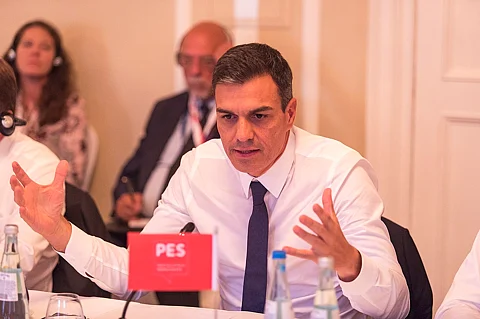

Spanish Prime Minister Pedro Sánchez publicly apologized on Thursday after a senior member of his Socialist Party (PSOE) was implicated in a high-profile kickback scandal, marking the latest corruption case to rattle his minority government.
“I stand before you today to ask forgiveness from the citizens and supporters of the Spanish Socialist Workers’ Party,” Sánchez said during a televised press conference at the party’s Madrid headquarters. His rare mea culpa followed reports that Spain’s Civil Guard had uncovered evidence linking Santos Cerdán, the PSOE’s third-ranking official, to an alleged scheme involving illegal commissions on public contracts.
The investigation, led by the Civil Guard’s Central Operative Unit (UCO), suggests Cerdán collaborated with former Transport Minister José Luis Ábalos and Ábalos’ ex-adviser, Koldo García, to secure kickbacks tied to infrastructure projects.
“The evidence is serious—very serious,” Sánchez acknowledged. “While corruption exists, there must be zero tolerance for it.”
Cerdán, who resigned hours earlier, denied wrongdoing in a statement, asserting he had “never committed a crime nor been complicit in one.” He vowed to cooperate with the Supreme Court, which is probing Ábalos and García. Ábalos, expelled from the PSOE in 2024, called the allegations “hoaxes and lies,” while García has consistently maintained his innocence.
The scandal deals a fresh blow to Sánchez’s embattled administration, which has faced mounting criticism over corruption allegations involving key allies. The center-right Popular Party (PP), the main opposition, has seized on the controversies, branding Sánchez’s government a “mafia” and mobilizing mass protests. Last weekend, tens of thousands demonstrated in Madrid, demanding his resignation.
Despite the turmoil, Sánchez ruled out stepping down or calling early elections, insisting he owed it to voters to continue his “political project.” A no-confidence vote would require majority parliamentary support, which PP leader Alberto Núñez Feijóo lacks without backing from the far-right Vox party—a partnership that could alienate smaller parties needed to unseat Sánchez.
The prime minister announced plans to restructure the PSOE’s leadership and audit its finances, aiming to distance the party from the scandal. “My disappointment is profound, but my response will be decisive,” he said.
Yet governance challenges loom. With two years left in his term, Sánchez must navigate a fractured parliament and reassure coalition partners wary of association with corruption. The opposition, meanwhile, shows no sign of relenting. PP senators disrupted a parliamentary session this week, chanting for Sánchez’s resignation.
The allegations against Cerdán follow a string of legal troubles for Sánchez’s inner circle. Last year, a court opened a preliminary inquiry into his wife, Begoña Gómez, over influence-peddling claims—a case Sánchez dismissed as a right-wing “smear campaign.”
Analysts note Sánchez’s resilience: since 2018, he has survived via fragile alliances and political maneuvering. But with public trust eroding, his ability to govern effectively hangs in the balance.
“This isn’t about me or the PSOE,” Sánchez said Thursday. “It’s about ensuring stability for Spain.” Yet as investigations unfold, stability may prove elusive.